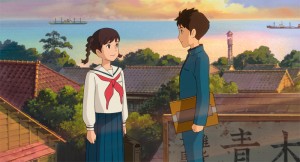From Up on Poppy Hill
Posted on April 4, 2013 at 6:00 pm
The animated films from Japan’s Studio Ghibli are adored by many American families for their lush and intricate hand-drawn animation and imaginative story lines. But others, like me, find many of them uneven and inaccessible. The latest, from Goro Miyazaki, son of legendary writer/director/animator Hayao Miyazaki (“Spirited Away,” “My Neighbor Totoro,” “Princess Mononoke”), has the gorgeous settings we expect from Ghibli, inspired as much by European fairy tales as by the mid-century Japanese seaside town where the story takes place. But it also has the inexpressive faces and oddly un-family-friendly storyline of some of the studio’s other productions. It seems more than a little off that a large part of the plot concerns a disturbing issue of possible paternity, a questionable theme for a movie about and intended to be seen by children.
Hayao Miyazaki co-wrote the film, based on a popular manga comic. Like many of the Studio Ghibli films, it is the story of a young girl who has had to take on a lot of responsibility. It is set in the Umi (voice of Sarah Bolger of “In America”), a quiet, respectful girl. She lives with her grandmother, who runs a boarding house above in the port city of Yokohama. Umi’s father was lost at sea fighting in the Korean War. Her mother is studying in America. Every day, Umi hoists a “safe voyage” signal flag for all the boats. In her heart, it is also a message to the father she still dreams will someday come back to her.
One day, she meets the outgoing, impulsive Shun (Anton Yelchin). As she works with him to help restore a dilapidated house Shun and his friends are using for their club meetings. They hope to persuade local officials not to knock it down. They never speak about their feelings but it is delicately shown that they are drawn to one another. And then they discover >they may be siblings. “I guess we stop feeling how we feel,” Shun says, and they agree to stay friends. Fortunately, they find a kind and reassuring answer to their question.
It is strange to see so much focus on the details of the backgrounds, which are exquisitely rendered, when there is so little attention to the expressiveness of the characters. The fluttering of a signal flag conveys more emotion than the impassive faces and delivery of the characters. The resonance of the story’s context in the years between Japan’s defeat in WWII and its hosting of the 1964 Olympics 20 years later will be lost on today’s children, which leaves the thin storyline inadequate to sustain our interest to the end.
Parents should know that this movie includes references to sad parental losses and separation and war and a discussion about how the two young teens who have romantic feelings for each other might be siblings.
Family discussion: What did Umi and Shun like about each other? Why was the house important to the kids?
If you like this, try: “Spirited Away”
